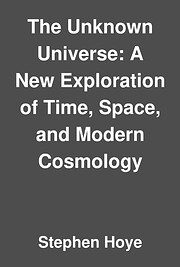

Fai clic su di un'immagine per andare a Google Ricerca Libri.
|
Sto caricando le informazioni... The Unknown Universe: A New Exploration of Time, Space, and Modern Cosmologydi Stephen Hoye
Nessuno Sto caricando le informazioni...
Iscriviti per consentire a LibraryThing di scoprire se ti piacerà questo libro. Attualmente non vi sono conversazioni su questo libro. nessuna recensione | aggiungi una recensione
Non sono state trovate descrizioni di biblioteche |
Discussioni correntiNessunoCopertine popolariNessuno
 Google Books — Sto caricando le informazioni... Google Books — Sto caricando le informazioni...GeneriVotoMedia: (4) (4)
Sei tu?Diventa un autore di LibraryThing. |
|||||||||||||||||||||||||||||||||||||||||||||||||||||||||||||||||||||||||||||||||||||||||||||||||||||||
The explanations offered for these last two developments are dark matter and dark energy. In this case, "dark" merely means that we do not have the faintest idea what they really are. We can't detect them. They don't seem to interact with ordinary matter at all. Except they hold galaxies together and expand the universe...
Dark matter and dark energy are hypotheses that explain the observed facts, but so far there's no direct evidence for either. Stuart Clark discusses the problems with this, as well as the other ways in which recent observations, including a high-resolution photograph of the earliest part of the universe we can detect, have produced findings that just don't fit well at all with the current "standard model" in physics.
He thinks we're due for a paradigm shift.
Realizing Earth orbits the sun, not the other way around, was a paradigm shift. Realizing our galaxy isn't the whole universe was a paradigm shift. At some point soon, he thinks, some young scientist somewhere will look at our current standard model, and throw out a basic assumption we all currently take for granted.
His story of the history of physics, astronomy, and cosmology is lively and interesting, and he makes a compelling case for the need for a new paradigm that allows us to explain our current observations of the universe without the current multiple fudge factors needed to make our equations work.
It's a fascinating book.
I bought this audiobook. (